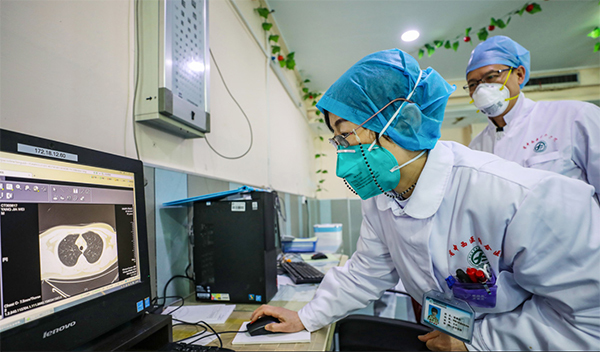On the evening of the 4th, Kim Jong-un departed from Beijing to return to North Korea. A video released by CCTV shows that the Chinese Communist Party organised hundreds of female students to send him off at the station. (Video screenshot)
[People News] On the evening of the 4th, Kim Jong-un left Beijing to head back to his country. The CCTV video shows that the Communist Party arranged for hundreds of female students to wave flags and shout, "Farewell, farewell, warm farewell," as they bid him goodbye. While Xi Jinping, Vladimir Putin, and Kim Jong-un were seen together during a military parade in Beijing, which was interpreted as a sign of alliance, the reality is that the three leaders are on the same boat but have different intentions.
The live video from CCTV featured members of the Politburo Standing Committee, including Cai Qi, Foreign Minister Wang Yi, and Beijing Mayor Yin Yong, who were present at the station to see him off. On the platform, hundreds of female students waved Chinese and North Korean flags, smiling and enthusiastically shouting, "Farewell, farewell, warm farewell." It remains uncertain whether Kim Jong-un understood their words, but amidst the excitement of the farewell, he smiled broadly and waved back continuously.

Kim Jong-un departed from Beijing to return to his country on the evening of the 4th. (Video screenshot)
The Korean Central News Agency reported that Kim Jong-un's special train, warmly sent off by Chinese comrades, slowly left Beijing Station, and he expressed sincere gratitude to the Communist Party for their arrangements.
On the 5th, the Korean Central News Agency reported that Kim Jong-un had returned to the North Korean capital of Pyongyang in the afternoon. Photos released show him disembarking alongside his daughter, Kim Ju-ae. The report also stated that Kim Jong-un's visit to China strongly highlighted the enduring and unbreakable friendship between China and North Korea.
Netizens engaged in lively discussions after witnessing the surreal farewell scene of Kim Jong-un.
Elementary school students waved their hands energetically, seemingly urging him, 'Go on, go on, the sooner you leave, the better.'
For someone of Chairman Kim's stature, this display is already quite modest.
I used to do similar things when I was a child. It truly feels like we've returned to the Cultural Revolution.
Still engaging in this kind of behaviour. A large nation of subservience.
Hahaha, what a humorous scene. We owe thanks to Kim Fatty III for providing so many entertaining topics for discussion. Great dictators are inherently dramatic. At times, they hold boundless power, while at other times, they are ruthlessly beaten down; they bask in glory while in power, but face brutal consequences when they fall. In democratic nations, people enjoy a prosperous life, but that prosperity can often feel monotonous. Thankfully, the dictators from authoritarian regimes offer a plethora of dramatic real-life stories, allowing citizens in democratic countries to enjoy daily entertainment.
During Kim Jong-un's recent visit to China, Xi Jinping welcomed him with a level of hospitality comparable to that extended to Vladimir Putin. However, the reports from China and North Korea regarding the discussions between Xi and Kim in Beijing present differing narratives.
The South Korean media outlet Chosun Ilbo reported that North Korea's Rodong Sinmun covered the outcomes of the summit between Kim Jong-un and Xi Jinping, which took place on September 4 at the Great Hall of the People. The report stated: 'They sincerely and frankly exchanged opinions on enhancing high-level exchanges and strategic communication between North Korea and China,' and 'mutually informed each other of the independent policy positions upheld by both countries' parties and governments in the realm of foreign relations.'
Chosun Ilbo analysed that the term 'mutual reporting' here differs from 'consensus of opinions,' indicating that both sides merely clarified their respective positions to one another.
According to a report from Xinhua News Agency, Kim Jong-un expressed his appreciation for China's fair stance on the Korean Peninsula issue, although this statement was not mentioned in the Rodong Sinmun. The report did not address the Korean Peninsula issue directly, instead stating that it "reported on the adherence to an independent policy stance in foreign relations" and "also discussed strengthening strategic cooperation in international and regional affairs to safeguard common interests."
In response, Hong Min, chief researcher at the Korea Institute for National Unification, remarked that it seems there are actual differences in the positions of the two leaders regarding the Korean Peninsula issue, indicating that they have not reached a consensus.
Hong Min further noted that Kim Jong-un might suggest that, based on North Korea's 'hostile two countries' stance, the relationship between the North and South is defined as state-to-state. He also mentioned the possibility of advancing constitutional amendments and seeking support from Beijing, but Beijing has shown an opposing or reserved attitude towards this.
Hong Min believes that, as a signatory to the armistice agreement, if the relationship between the North and South shifts to a 'state-to-state' framework, the armistice agreement would lose its validity, and the Chinese Communist Party would lose its influence over the Korean Peninsula, which is likely to make them cautious about this development.
Additionally, Xinhua News Agency reported that Kim Jong-un expressed gratitude for China's long-standing unwavering support for North Korea's socialist cause and for its valuable assistance, although this was not mentioned in the Rodong Sinmun.
Moreover, according to Xinhua News Agency, Kim Jong-un stated that they would engage in experience exchanges in areas such as party building and economic development to support the development of the North Korean party and national construction. He also expressed a willingness to deepen mutually beneficial economic and trade cooperation between the two countries to achieve more results, but this part of his statement was also omitted by the Rodong Sinmun.
Kim Jong-un stated, "The Democratic People's Republic of Korea (DPRK) will continue to firmly support China's position on issues related to its core interests, such as Taiwan, Tibet, and Xinjiang," a statement that was not reported by the Labor News.
Notably, the content of the statements from both North Korea and China this time differs from the previous four summit meetings between Kim Jong-un and Xi Jinping, as there was no mention of the denuclearisation of the Korean Peninsula. Hong Min remarked, "We cannot rule out the possibility that Beijing has temporarily shifted its stance to support the legitimacy of North Korea's nuclear armament."
Additionally, on September 7, the South Korean Ministry of Justice, the Ministry of Culture, Sports and Tourism, the Ministry of Foreign Affairs, and the State Affairs Coordination Office jointly announced a plan for the temporary visa exemption for Chinese group tourists. This plan allows Chinese group tourists organised by domestic and foreign specialised travel agencies, consisting of three or more people, to travel to South Korea without a visa for a period of 15 days until June 30 of next year. Since November of last year, China has permitted South Korean nationals to enter without a visa. △











News magazine bootstrap themes!
I like this themes, fast loading and look profesional
Thank you Carlos!
You're welcome!
Please support me with give positive rating!
Yes Sure!